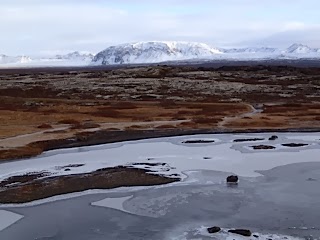On a sunny day in Iceland, when I'm traveling east out of Rekjavik, it's almost impossible not to detour to Thingvellir, as I did last week.
Approaching these Assembly Plains in 1871, William Morris wrote, "My heart beats, so please you, as we near the brow of the pass, and all the infinite wonder, which came upon me when I came up on the deck of the [ship] to see Iceland for the first time, comes on me again now, for this is the heart of Iceland…"
In spite of his flowery Victorian prose style, Morris speaks for me too: My heart does beat faster when I see the great rift valley of Thingvellir beside its deep blue lake.
Here is where the tectonic plates are pulling apart, America getting infinitesimally farther from Europe with each passing year.
And here, on the tenth Thor's Day of summer each year from 930 to 1262, Icelands chieftains and their wives and children and followers gathered for the Althing, the General Assembly of all Iceland.
In the medieval Icelandic sagas--what Morris familiarly calls "those old stories"--the Althing is a grand party. Thousands of people stayed for two weeks in tents and turf-walled booths on the banks of the Axe River, drinking ale, telling tales, taking part in horse fights and wrestling matches, races and dice games, making wedding plans or finalizing divorces, witnessing court cases, and wrangling over the law.
Disputes between Icelanders of any rank could be settled at the Althing, by appeal to Iceland's laws. There was no king to enforce the laws. Instead, there were five law courts: one for each quarter of the country plus an appeals court, each with 36 judges. The judges were chosen by the chieftains, each chieftain being allowed to nominate or to veto a certain number.
Presiding over the courts was Iceland's only elected official, the Lawspeaker. The first Lawspeaker brought the laws of western Norway to Iceland in 930. For nearly two hundred years, until 1118, the Lawspeaker recited from memory one third of the law code at each Althing. After that, the laws were read aloud from a lawbook.
The place where he stood to recite, the Law Rock, is marked now by a flagpole. (Notice that the flag is hanging limp. It's almost never this calm in Iceland.) This height of land, with its backdrop of columnar basalt, formed a natural amphitheatre. The chieftains gathered below the Law Rock and, after the recitation, the laws were debated, adjusted, and agreed upon for, as it says in
Njal's Saga, "With laws shall our land be built up, but with lawlessness laid waste."
There were laws concerning stolen horses, rented cows, dogs that bit, or bulls that ran amok in the neighbor's haystacks. There were laws about betrothals and divorces, buying sheep or claiming debts. There were laws concerning the welfare of orphans, widows, the sick, the handicapped, and the poor. There were laws about renting land or investing in a trading ship. There were numerous laws defining murder and homicide, setting the compensation a killer should pay the victim's family if he hoped to avoid being exiled from the island.
Of course, not everyone followed the laws and not every feud was peacefully settled. One of the great themes of the Icelandic sagas is what happens when someone defies the law.
Of Iceland in general, William Morris wrote, “It is an awful place: set aside the hope that the unseen sea gives you here, and the strange threatening change of the blue spiky mountains beyond the firth, and the rest seems emptiness and nothing else: a piece of turf under your feet, and the sky overhead, that's all; whatever solace your life is to have here must come out of yourself or these old stories, not over hopeful themselves."
Iceland is indeed an awful place: a place that fills me with awe. "Whatever solace your life is to have here must come out of yourself or these old stories." Is it different anywhere else?
Join me again next Wednesday at nancymariebrown.blogspot.com for another adventure in Iceland of the medieval world.









No comments:
Post a Comment